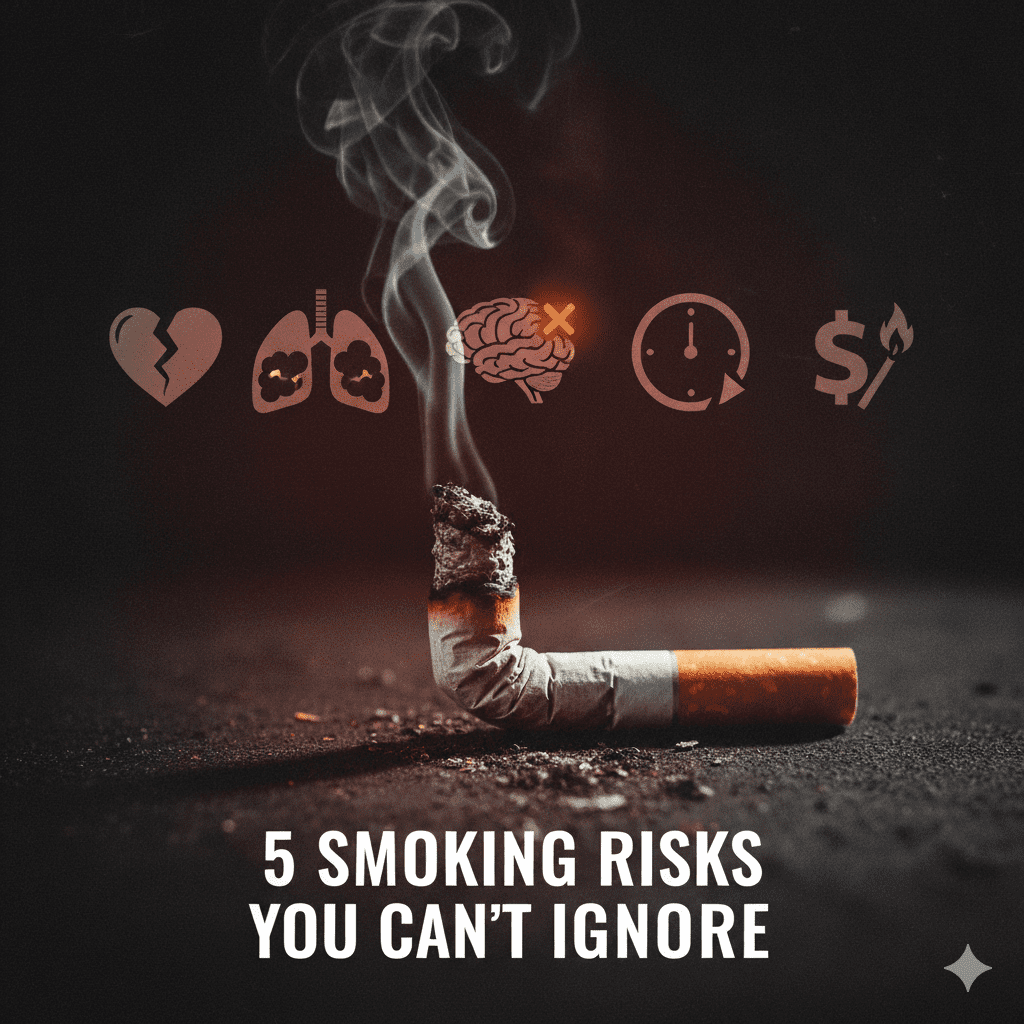Key Takeaways
- Smoking is a major cause of lung cancer, and it’s linked to many other types of cancer too.
- It significantly increases your risk of developing type 2 diabetes and makes complications from the disease worse, potentially leading to limb amputation.
- Smokers are much more likely to suffer from gum disease, which can result in tooth loss and bone damage.
- Tobacco use is a leading factor in heart disease, stroke, and other issues affecting your blood vessels.
- Smoking leads to faster bone density loss, raising the chances of fractures, especially in the hip.
1. Lung Cancer

It’s no secret that the dangers of cigarettes are serious, and lung cancer is probably the most well-known of the health effects of smoking. But let’s get real about why quitting smoking is important when it comes to this specific disease. The chemicals in cigarette smoke are nasty; they mess with our DNA, the very blueprint of our cells. Over time, this damage builds up because our cells struggle to fix it, and that’s how cancer starts.
Smoking is the leading cause of lung cancer, responsible for a huge chunk of cases. It’s not just about smoking yourself, either; breathing in someone else’s smoke, known as passive smoking, also significantly raises your risk. Even if you only smoke a little or consider yourself an occasional smoker, there’s no safe level. The longer you smoke and the more you smoke, the higher your chances of developing smoking related illnesses like this one.
Here’s a quick look at how smoking impacts your lungs:
- DNA Damage: Carcinogens in smoke directly harm your DNA.
- Impaired Repair: Smoking hinders your body’s ability to fix DNA damage.
- Cumulative Effect: This leads to a build-up of damage, increasing cancer risk.
If you’ve got a cough that won’t quit, shortness of breath, or any new symptom that just won’t go away, don’t brush it off. Talk to your doctor. It could be nothing, or it could be a sign of something serious like lung cancer. It’s always better to get it checked out.
Remember, it’s never too late to stop. Quitting smoking is the single best step you can take to lower your risk of lung cancer and many other health problems.
2. Type 2 Diabetes
It’s not just your lungs that take a hit when you smoke; your chances of developing type 2 diabetes also go up. Smoking messes with how your body handles sugar, making it harder for your cells to respond to insulin. This can lead to higher blood sugar levels over time. If you already have diabetes, smoking makes it even tougher to manage.
Here’s a quick look at how smoking impacts diabetes:
- Increased Risk: Smokers are about 30-40% more likely to develop type 2 diabetes than non-smokers.
- Worse Complications: For those with diabetes, smoking significantly raises the risk of serious problems like poor blood flow to the feet and legs. This can unfortunately lead to infections and even amputation.
- Harder to Control: Smoking can make it more difficult to keep blood sugar levels in check, even with medication.
The chemicals in cigarette smoke interfere with the way your body uses insulin, the hormone that controls blood sugar. This disruption is a direct pathway to developing type 2 diabetes and makes existing diabetes much harder to manage effectively.
Quitting smoking is one of the best things you can do to lower your risk of developing type 2 diabetes or to better manage it if you already have it. It’s a big step towards improving your overall health.
3. Gum Disease

It’s not just your lungs and heart that suffer when you smoke; your mouth takes a serious hit too. Smoking is a major player in gum disease, also known as periodontal disease. This isn’t just about a little bleeding when you brush. We’re talking about an infection that attacks the very foundation of your teeth – the bone and tissues holding them in place. Smokers are significantly more likely to develop gum disease than non-smokers.
When you smoke, your blood flow to the gums decreases. This means your gums don’t get the oxygen and nutrients they need to stay healthy. Plus, smoking weakens your immune system, making it harder to fight off the bacteria that cause gum infections. You might notice symptoms like red, swollen, or bleeding gums, persistent bad breath, and eventually, receding gums that make your teeth look longer. Over time, this can lead to teeth becoming loose and even falling out entirely.
Here’s a quick look at how smoking impacts your gums:
- Reduced blood flow to gum tissues.
- Impaired immune response to oral bacteria.
- Increased risk of infection and inflammation.
- Slower healing after dental procedures.
The chemicals in cigarettes don’t just stain your teeth; they actively harm the delicate tissues in your mouth. This damage makes it much harder for your gums to fight off the bacteria that cause periodontal disease, creating a cycle of inflammation and destruction.
Quitting smoking is one of the best things you can do for your oral health. Even after quitting, it’s a good idea to keep up with regular dental check-ups and cleanings to monitor your gum health and address any issues. You can find resources to help you quit smoking here.
4. Heart Disease
Smoking really messes with your heart and blood vessels. It’s not just about lung cancer, you know? When you smoke, all those nasty chemicals start to build up in your arteries, making them narrower. This process, called atherosclerosis, makes it way harder for blood to get where it needs to go. This significantly increases your risk of a heart attack or stroke.
It’s not just one thing either. Smoking can lead to:
- Coronary heart disease: This is when the arteries supplying blood to your heart get all clogged up.
- Heart failure: Your heart just can’t pump blood effectively anymore.
- Arrhythmia: Your heart starts beating all wonky – too fast, too slow, or just irregular.
- Peripheral artery disease (PAD): This affects the blood vessels in your arms and legs, often causing pain when you walk.
Basically, smoking makes it tough for your body to maintain optimal heart function. It’s a major player in why so many people struggle with heart health. Quitting is one of the best things you can do to get your cardiovascular system back on track.
5. Hip Fractures
It’s not just your lungs and heart that take a hit when you smoke; your bones are also at risk. Smoking significantly speeds up bone loss, making your bones weaker and more prone to breaking. This is especially concerning when it comes to your hips. People who smoke tend to have lower bone density compared to non-smokers, which means a simple fall could lead to a serious hip fracture.
Think about it: your bones are constantly remodeling, building new bone and breaking down old bone. Smoking messes with this delicate balance. It reduces the amount of calcium your body absorbs and interferes with the hormones that help maintain bone health. Plus, smoking can affect your coordination and vision, increasing your chances of falling in the first place.
Here’s a quick look at how smoking impacts bone health:
- Reduced Bone Density: Smoking leads to a faster loss of bone mass, making bones brittle.
- Impaired Healing: Fractures in smokers often take longer to heal.
- Increased Fall Risk: Smoking can affect balance and vision, raising the likelihood of falls.
- Nutrient Absorption: It hinders the body’s ability to absorb vital nutrients like calcium.
Quitting smoking is one of the best things you can do for your bones. As soon as you stop, your body starts to improve its ability to build and maintain bone. This can help slow down bone loss and reduce your risk of fractures down the line. It’s never too late to make a positive change for your skeletal health.
So, if you’re worried about staying mobile and independent as you age, putting out those cigarettes is a major step in the right direction. It’s about protecting your whole body, including the framework that keeps you upright.
It’s Never Too Late to Quit
So, we’ve talked about some pretty serious stuff, from losing limbs to serious heart problems and even cancer. It’s a lot to take in, I know. But the main takeaway here is that smoking affects your body in so many ways, ways you might not even think about, like your teeth and gums or even increasing the risk of certain birth defects. The good news, though? It’s never too late to make a change. Quitting smoking, even after years of smoking, can start to reverse some of the damage and significantly lower your risk for many of these health issues. There are tons of resources out there to help you quit, whether it’s talking to your doctor, using nicotine replacement therapy, or finding a support group. Taking that step is one of the best things you can do for yourself.
Frequently Asked Questions
What is the main reason smoking is so bad for your lungs?
Smoking is the top cause of lung cancer. The smoke has over 5,000 chemicals, and at least 70 of them can cause cancer. These harmful chemicals damage the DNA in your cells, which control how they grow. This damage can build up over time and lead to cancer.
How does smoking lead to problems like losing a foot?
Smoking makes blood vessels narrower all over your body. This includes the vessels that supply blood to your legs and feet. Poor blood flow can cause serious problems, like infections and tissue death, which might even lead to losing a limb.
Can smoking affect my teeth and gums?
Yes, smoking is a major cause of gum disease. It reduces blood flow to your gums, making them more likely to get infected and causing them to pull away from your teeth. This can lead to tooth loss. Smoking also stains your teeth and causes bad breath.
Does smoking increase the risk of heart problems?
Absolutely. Smoking is a big factor in heart disease. It can cause arteries to narrow, which can lead to chest pain, heart attacks, and heart failure. It also increases the risk of stroke, which happens when blood flow to the brain is blocked.
Can smoking lead to broken bones, like a hip fracture?
Yes, it can. People who smoke tend to lose bone density faster than those who don’t. This makes their bones weaker and more likely to break, especially in places like the hip. Quitting can help slow this bone loss.
Is vaping a safer alternative to smoking?
While vaping might not have tar, it still contains nicotine and other chemicals that can harm your oral health and overall body. It’s been linked to gum problems and enamel wear. It’s important to remember that ‘less harmful’ doesn’t mean ‘harmless’.



